"We are running away from one place, and we end up coming to an even worse one," says Miriam Rodríguez, an immigrant from Honduras currently in Mexicali, Mexico.
Everyone who watches or reads US news has seen images of immigrant families in some of their most stressful moments, from precariously crossing the border by boat to sobbing in detention. The footage is familiar, and the southwest border of the US is expected in 2021 to see the highest numbers of asylum-seekers and immigrants it has in 20 years.
This is partially due to Title 42, an order enacted under the Trump administration and kept in place by the Biden White House that, citing the coronavirus pandemic, allows the US to quickly turn immigrants back to Mexico without giving them a chance to seek asylum. Not only has Title 42 blocked asylum-seekers from attempting to gain protection, it has also led many people to attempt to cross the border multiple times, resulting in higher numbers of encounters with authorities.
Many of the families who have attempted to cross into the US in recent years have also gotten stuck in dangerous border cities as a result of the Trump administration’s Migrant Protection Protocols (MPP) policy, enacted in 2019, which forced over 71,000 immigrants and asylum-seekers to wait in Mexico until US immigration courts could rule on their cases. On June 1, the Biden administration formally ended MPP, and since then, some families have been able to seek asylum. However, thousands of families are still being sent to Mexico under Title 42. President Joe Biden has reportedly been briefed on a plan to stop the practice, formally known as expulsions, for families by July 31, but for now, parents and children are left waiting and wondering.
What happens to these families after they are sent to Mexico? What are their stories and hopes for the future?
Beyond Migrant is a series of portraits of families who have gotten caught in the limbo of US immigration policies and been sent to Mexico after trying to seek asylum. The series, by Hailey Sadler, highlights the stories of 15 families using a makeshift photo studio in the small border town of Mexicali, Mexico, in May. Each portrait was shot against a uniform black backdrop in order to invite viewers to engage with the subjects’ stories beyond their momentary circumstances.
The project received logistical support from Border Kindness, a nonprofit that provides holistic services and legal counsel to asylum-seekers, immigrants, and refugees in Mexicali.
"I am afraid for him." —Oscar Pineda, 45
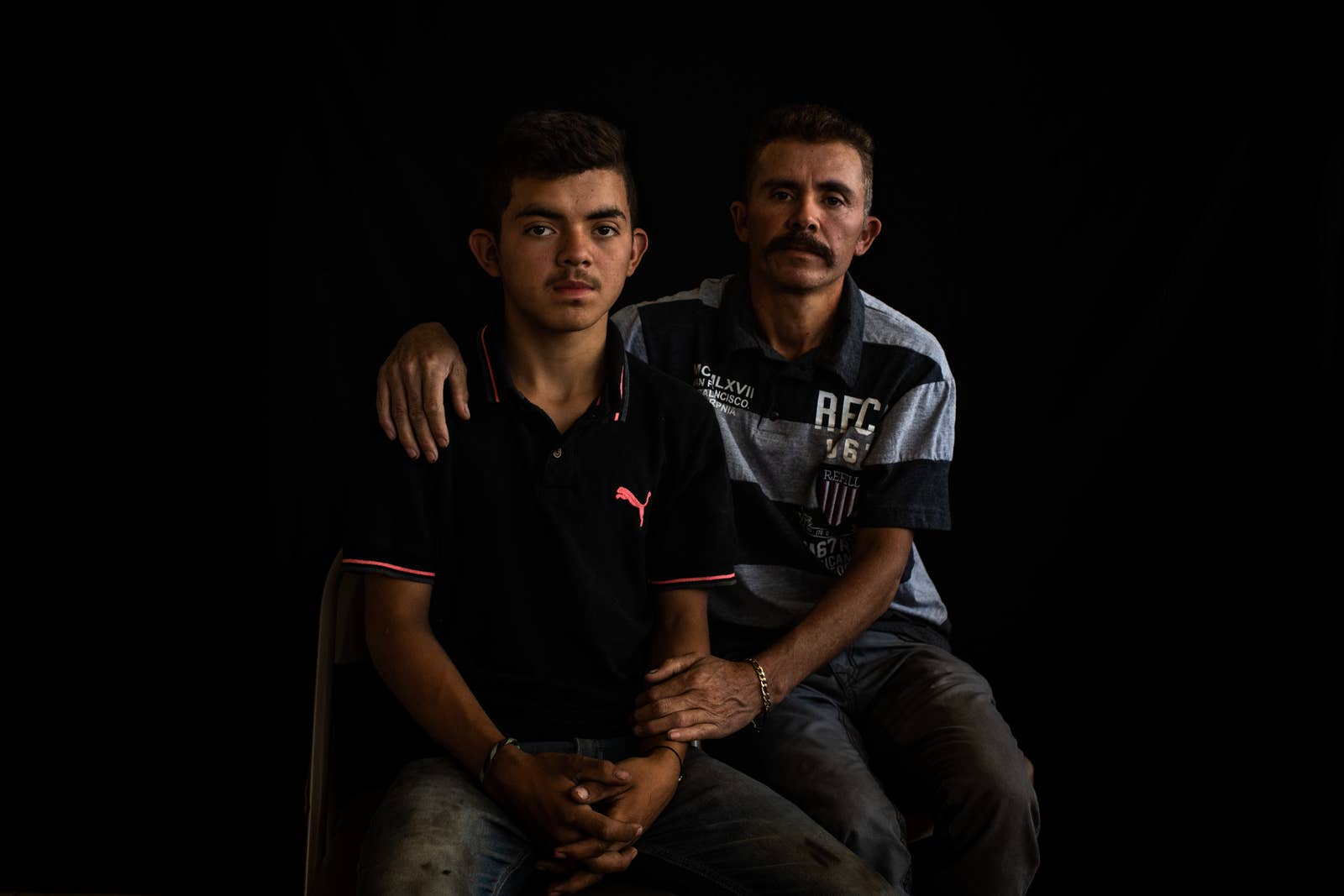
Oscar Pineda, 45, and his 16-year-old son, also named Oscar, have been living in limbo in Mexicali for a little over three years. A mechanic by trade, Pineda fled his home country of Honduras after being targeted by a local gang. He stretches out his hand to show a healed bullet wound. His son was with him when it happened.
The father and son spent four days braving the desert heat to cross from Mexico into San Diego, where they turned themselves in to immigration officials. They were sent back across the border into Tijuana, Mexico, but then traveled to Mexicali. “I had already lived here in Mexicali for a while, so I felt more confident about living here,” says Pineda.
For the past three years, they have been waiting, working enough to support themselves, and hoping for a legal way to cross into the US. Stuck between their past and future, Pineda describes feeling torn between the dangers of attempting to cross again and the dangers of returning home. He says they will keep waiting. “I am afraid for him,” Pineda says of his son. “For me, I make up my mind to whatever destiny touches me, but for him, I am patient… I am very afraid that the gangs will get him, because he is just starting to live. That is the fear.”
After this interview was conducted, with help from Border Kindness, Oscar and his son were able to seek asylum in the United States.
"I missed the courts. I missed the date." —Vilma Peraza, 29
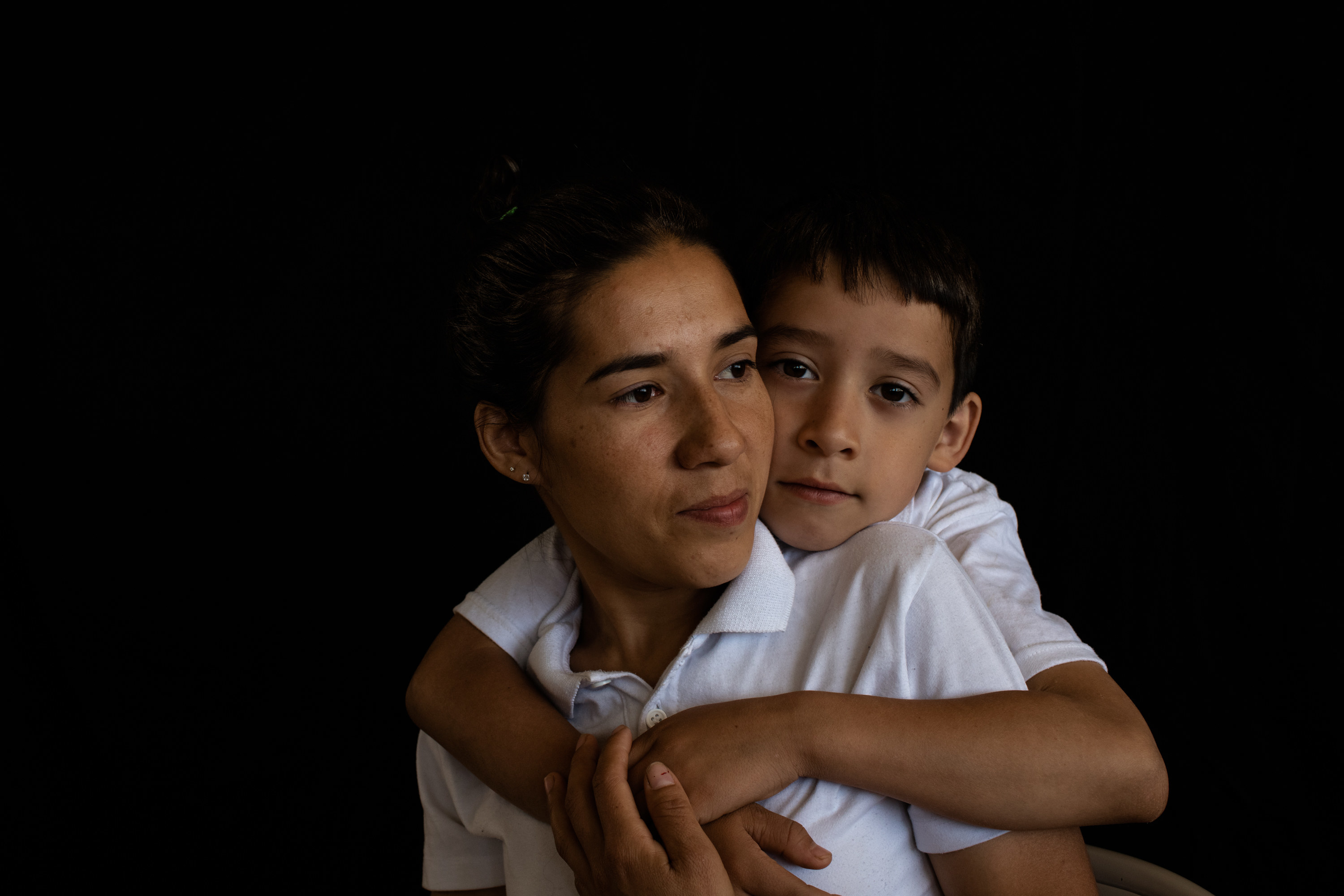
Vilma Peraza, 29, says her biggest regret is leaving her daughter behind in Honduras. But she didn’t know what else to do. She has been separated from her husband for five years. As a single mom, she made the difficult decision to leave her home with a migrant caravan in 2018, in hopes of being able to fight for a better future for her children in the United States.
She was concerned about making the dangerous journey alone with two young children, so she left her 10-year-old, Adriana Rosemary, in Honduras with her parents and brought her son, Jefferson, who was 3 years old at the time. Peraza’s eyes fill with tears as she shares their story. "It was a very difficult moment. I’m sorry." Jefferson, now 6, sits next to her, and he reaches out to softly scratch her back. Peraza regrets leaving Adriana behind, she says, "because it is not the same for the children to be with their mother as it is for them to be with someone else."
Peraza and Jefferson arrived in Mexico in 2019 and tried once to cross into the United States. From Honduras, Peraza’s dad paid the equivalent of $10,000 to a coyote who promised his daughter and grandson would make it safely into the US. "Our guide didn’t tell us that we were going to be caught by immigration," Peraza says. "He didn’t say a word, and they caught us. They kept us locked up for eight days. … They told us to wait here in Mexico. Then they deported us here to Tijuana."
Peraza feels cheated by the coyote. "If he had told me, 'You know they are going to catch you,' I wouldn’t have gone to the other side. I would have waited for them to give me asylum and I wouldn’t have crossed."
Being alone as a single mother in a foreign country, uncertain of your status, is daunting, Peraza says. "Since I knew absolutely nothing about here, I had zero help. Then I met some friends and they brought me here [to Mexicali]. I had no help at all, so I couldn’t go to the court. I couldn’t tell you what the court is. … They just say, 'You have to go to a court here.' But I didn’t even have a phone. ... I didn’t know anything. I couldn’t even travel. I was afraid. I had no idea. So I missed the courts. I missed the date."
Peraza and Jefferson have been in Mexicali for three and a half years now. Peraza works as much as possible and calls home often to check in on her daughter. Whenever she can, she tries to check the TV to see if there's news of the ever-changing and complex US immigration policies that affect her case.
"I always watch the news and feel hopeful about President Joe Biden giving us asylum. … Therefore, we are waiting for the necessary time to see what happens next."
"I’m waiting," she says, "to see if I’m given another chance."
"It hurt me to have to come." —Kevin Godoy, 23
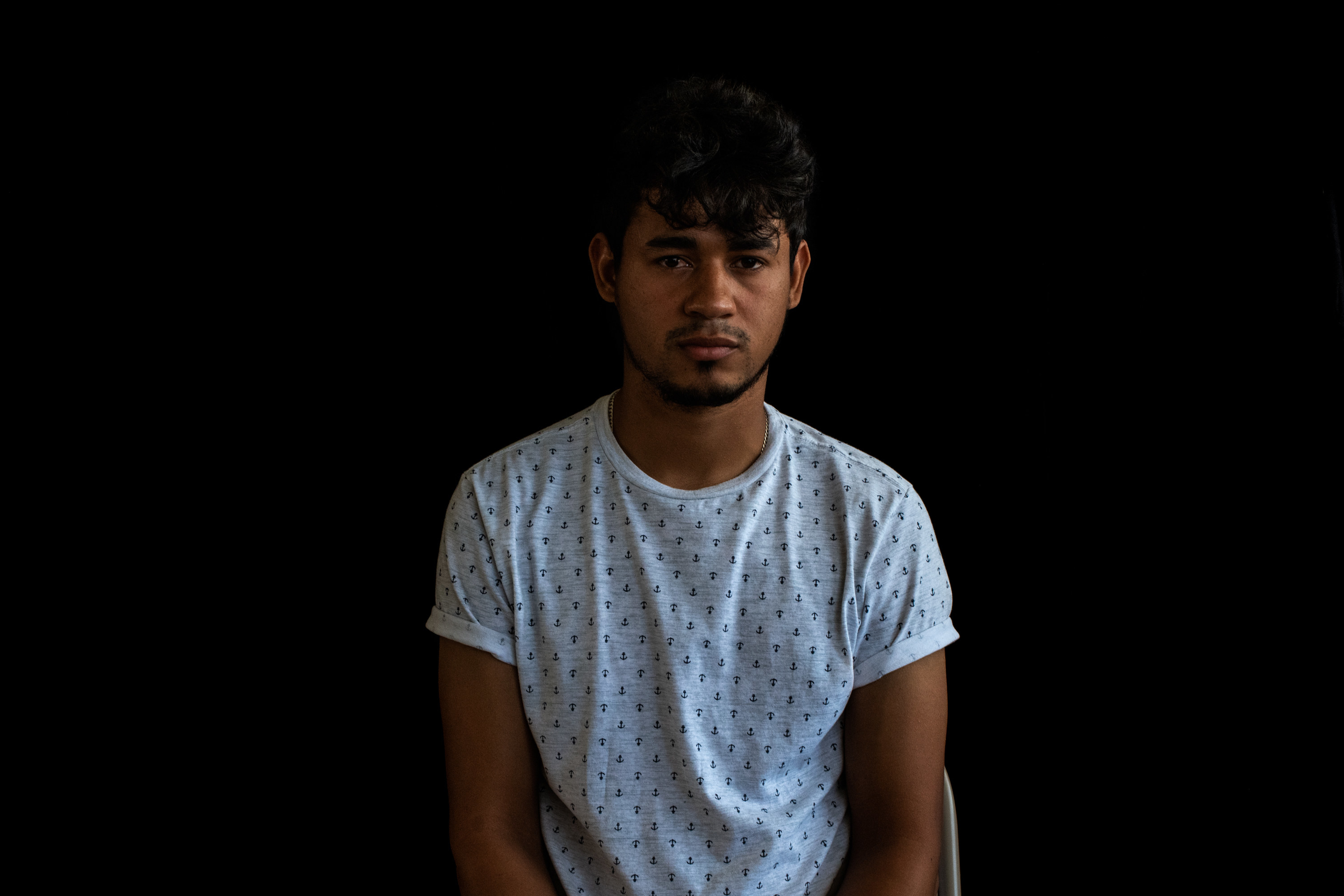
"The truth is that my mother told me to come, because a cousin of mine was killed," says Kevin Godoy. He is 23 years old and alone. "So I couldn’t stay with her. It hurt me to have to come, but I am always in contact with her."
Godoy’s father left him and his mother when Godoy was only 2 years old, so he grew up very close with his mom. He saw how hard she worked to provide for him and his three sisters. "My whole life, she was there for me. Since I was little, she never let me lack — schoolbooks, food, home — she was always with me."
"Because I was carrying some papers to be able to defend myself to ask for asylum, I was calm," Godoy remembers of when he encountered Border Patrol. "I thought they were going to help me. I did not think it was going to happen the way it did. They took everything from me, my backpack, they threw the food away, and they told me that the papers were useless. They did not even let me speak to explain that I wanted asylum, and they tore my papers. ... I picked them up, I kept them, and I brought them with me. But since I thought they were not going to be of any use to me, I threw them away."
That was three years ago. Godoy has not tried to cross again. For now, he’s focused on surviving in Mexicali with whatever odd jobs he can find. Eventually, he hopes to join his cousin in Bryan, Texas, and to be able to provide for his family.
"We were left without a house. That's why we came here, to move forward." —Norqui Regina Cortes, 26
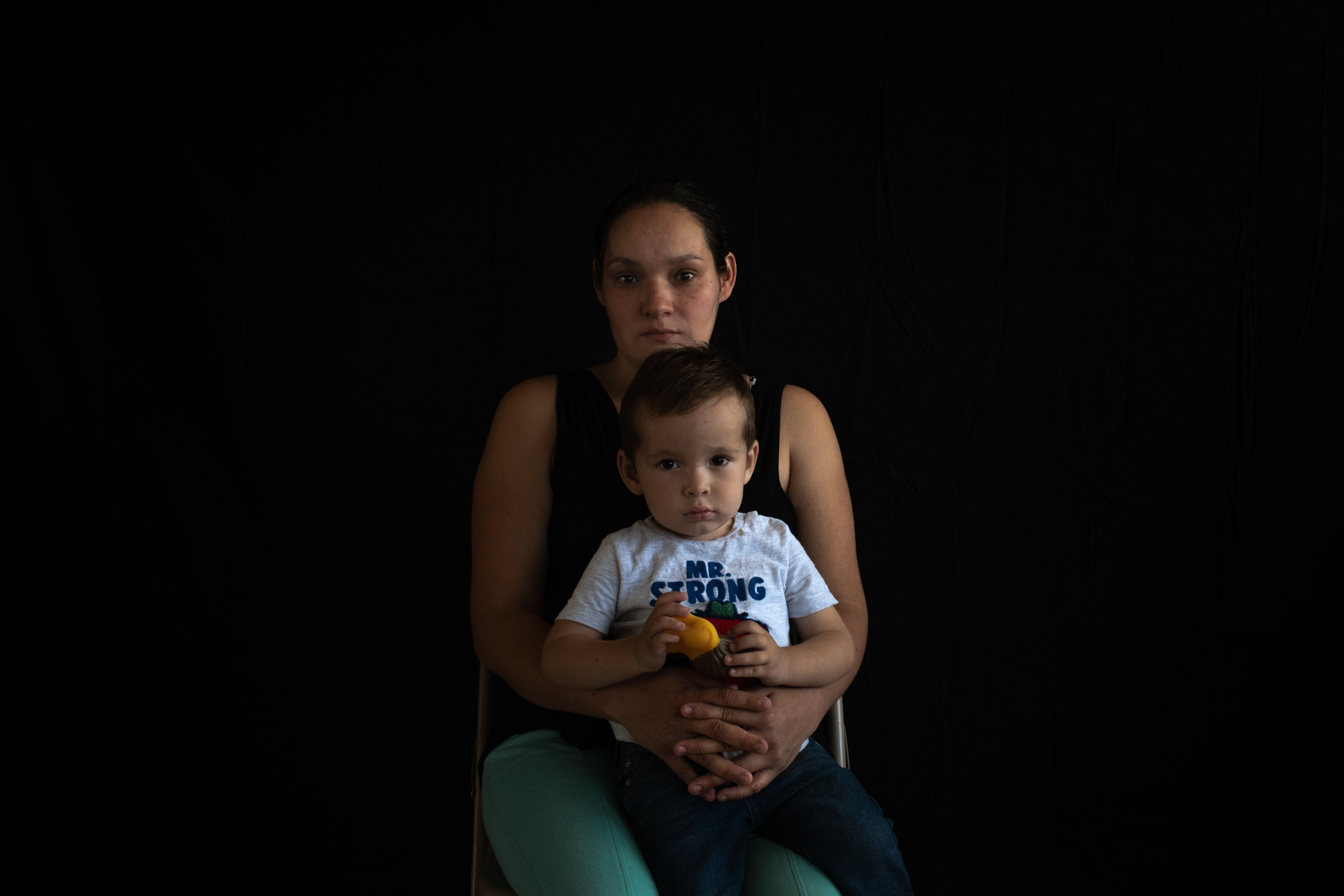
"We were left without a house. That's why we came here, to move forward…" Norqui Cortes’ voice trails off. She, her husband, and their 2-year-old son, Edrás, left Honduras after the devastation of hurricanes Eta and Iota in December 2020. "We tried to cross twice, but US immigration sent us back."
Currently, Cortes and her husband and son live in a shelter. "It’s a little bit bad," Cortes says. It’s very hot. Ventilation is poor and, like most shelters or migrant hotels in Mexicali, it’s desperately overcrowded. Multiple families will pile into a single room. Often, the only privacy is in the bathroom. It’s no place to raise a child. Cortes had hoped to get to the United States so that Edrás would have a chance to study when he gets older and find a trade. "Sometimes I feel there is no more hope. But I don't want to go back to my country either, there is no work."
After this interview was conducted, with help from Border Kindness, Norqui and her family were able to seek asylum in the United States.
"They just came and they're leaving, and I'm still here." —María Serrano, 61
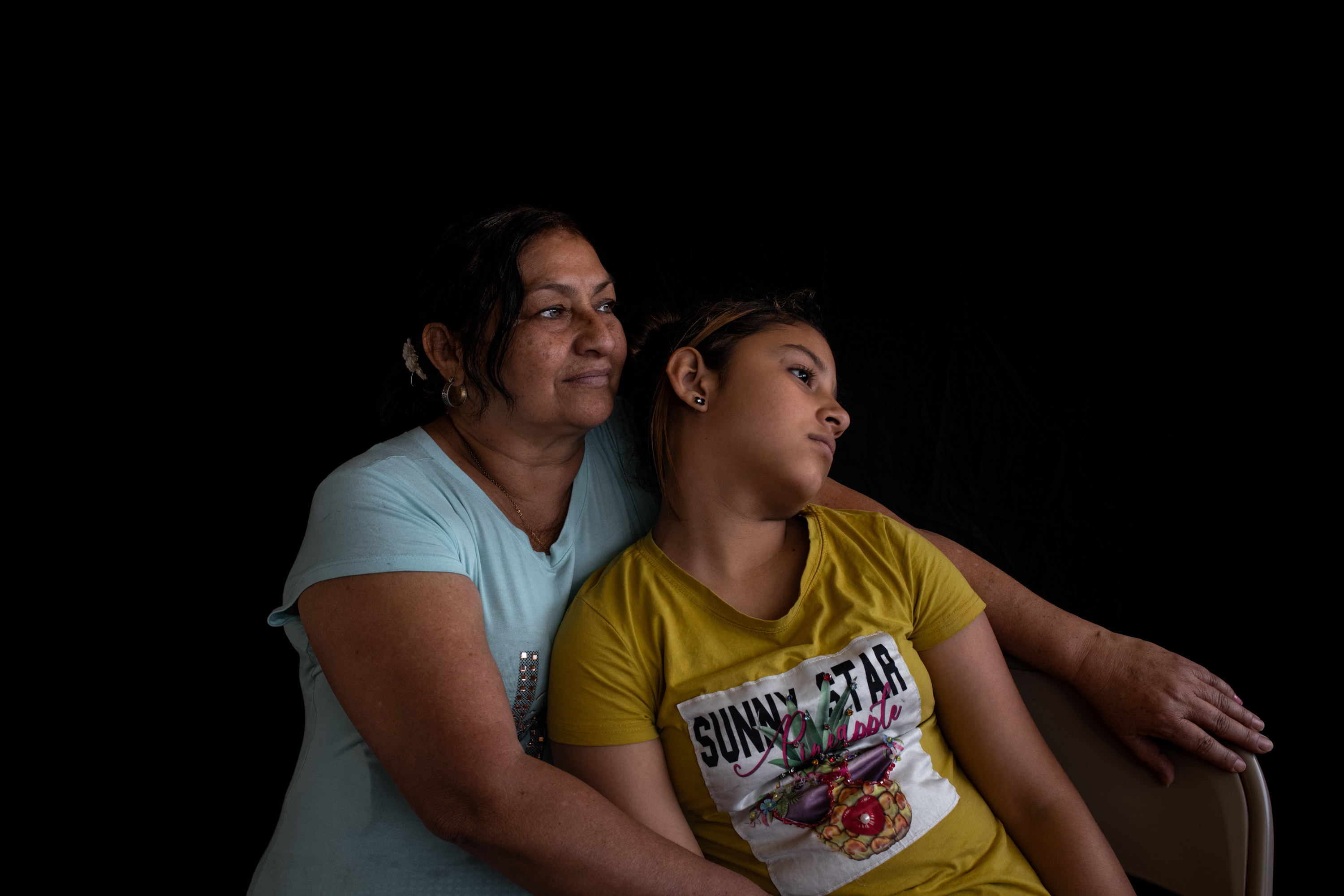
María Serrano, 61, and her 11-year-old granddaughter, Asli González, have been waiting for two years now. It is hard, Serrano says, to see other migrants who came after them successfully cross the border before them.
Still, as Serrano waits for their chance, she tries to help other immigrants along their journeys. "I had no help from anyone," says Serrano about when she and her granddaughter first arrived in Mexicali. They stayed in one of a handful of overcrowded shelters, where families can rent a bunk bed or pitch a tent on a spot on the floor. Serrano says it was a difficult adjustment from home. "It was a big problem just going to the bathroom to bathe or to wash. There were long waiting lines."
Eventually, they moved to a small house, which they share with several other families. Here, Serrano has been able to provide help to other immigrants who are in the same position she was in two years ago. She’ll offer bottled water. Often, Serrano allows them to share their tiny room and sleep in their bed while she and her granddaughter sleep on a mattress on the floor. Most recently, Serrano housed a group of migrant girls who were trying to make it across the border. When Serrano received a call on her cell phone to tell her the girls had made it across safely, she said it was bittersweet. "When they called with the news, I felt so happy." But then it sank in. "They just came in and they’re leaving, and I’m still here." Asli cried a lot after the girls left. It’s hard to be left behind. She said, "I pray to God that God will give us the chance to be in the United States."
Serrano fled Honduras with her granddaughter because they were afraid for their lives. Serrano’s son was killed by a gang when Asli was 2 years old. Ever since then, Serrano has taken care of Asli as if she were her own daughter. Seven years passed. Then, one day, the same gang members came back. "I didn’t want to leave, but I had to leave."
They tried once to cross the border through Tijuana into San Diego. They were deported under MPP and given a date for a hearing in a US federal immigration court. Serrano says she went to court four times, but then, on March 20, 2020, all court proceedings were halted and MPP hearings suspended due to the COVID-19 pandemic. Now Serrano is unsure about the status of her case. While they wait, she and her granddaughter try to keep their spirits up. Serrano says they will continue to help other immigrants who arrive in Mexicali. They’re hoping that, with legal counsel, they can be granted asylum and make it to Serrano’s daughter and son-in-law, who live in Iowa.
Serrano says that she keeps up hope for Asli’s sake. "It is mostly because of her. Also to be with my daughter, my family there, my other grandchildren ... but mostly for her. … That is why I have put up with so much here, asking God for a little place so that I can go with my little girl. I have not lost it — I have that hope."
"I don’t know if we’re going to get out of this or not." —Dania Cruz, 26
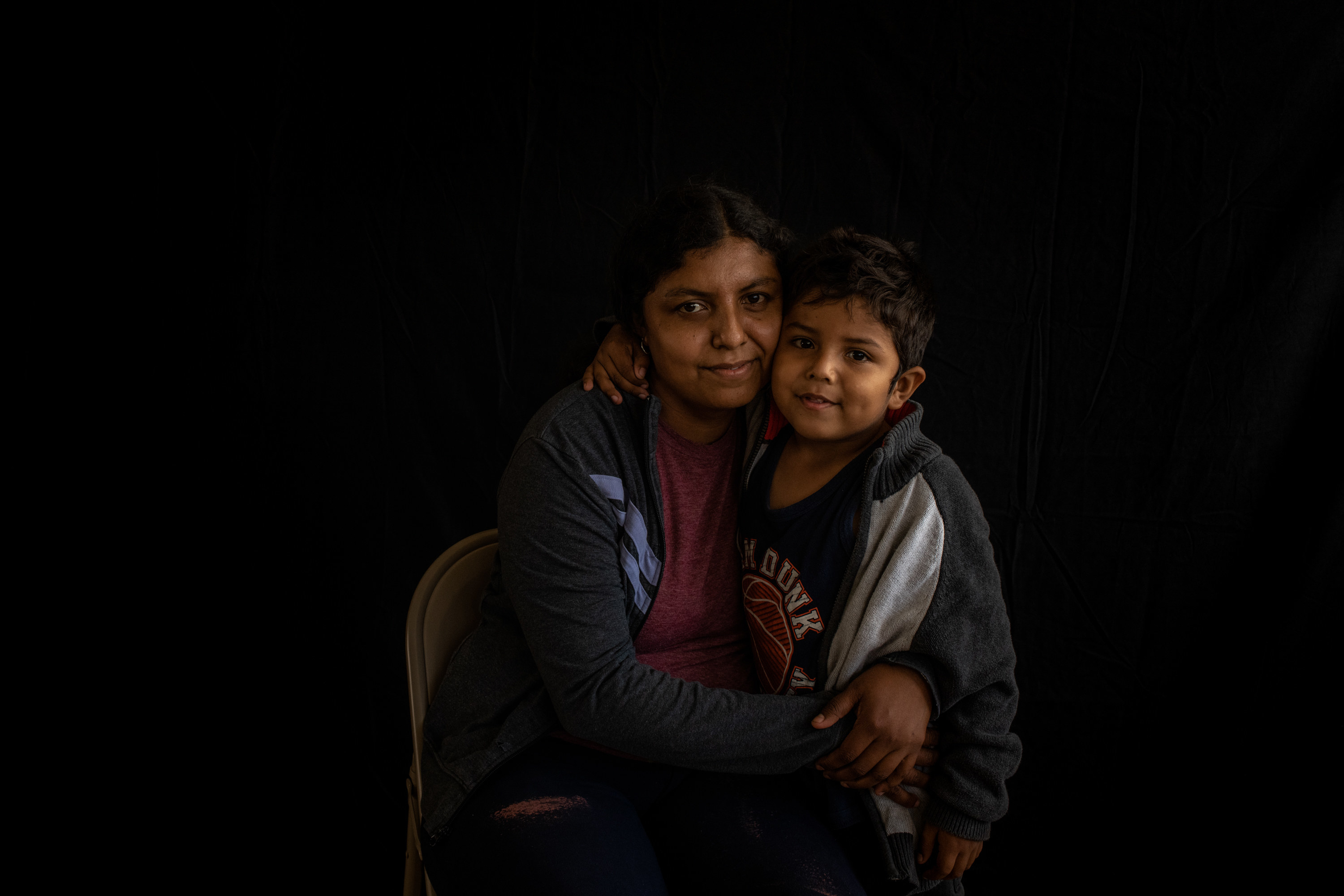
"They gave us less than 24 hours to disappear," says Dania Cruz, 26. She fled with her husband and 5-year-old son after her husband’s family received death threats from a local gang in Honduras. It was retaliation after her brother-in-law filed a complaint against a gang member. The whole family fled in hours. "It was very difficult, since we really had to lose everything," Cruz says.
They left in November 2020, walking, hitchhiking, and taking buses or trains whenever possible. On January 10, they arrived in Mexico, and by March 18 they had made it to Mexicali. Here, they’ve been trying to figure out the situation at the border and weigh what their options are. They have not tried to cross. They want to ensure they are entering the United States legally: "I wouldn’t want to put my son at risk...because that is a risk, doing it on your own," says Cruz. In the meantime, her husband has been working whenever he can as a truck loader to pay the fee for the shelter they are staying in.
There is anxiety in the waiting. "Here, it is also a high risk sometimes," says Cruz. "Recently, two boys were kidnapped around here, where we are staying right now... It isn’t safe, either here or back in my country."
"I don’t know if we are going to get out of this or not," says Cruz. The future feels uncertain. "We are in a balancing act, because we don’t even know what to do in this situation we are going through now. We are having a very bad time."
"Knowing that she is somewhere else and I am here, it is hard." —Miriam Rodríguez
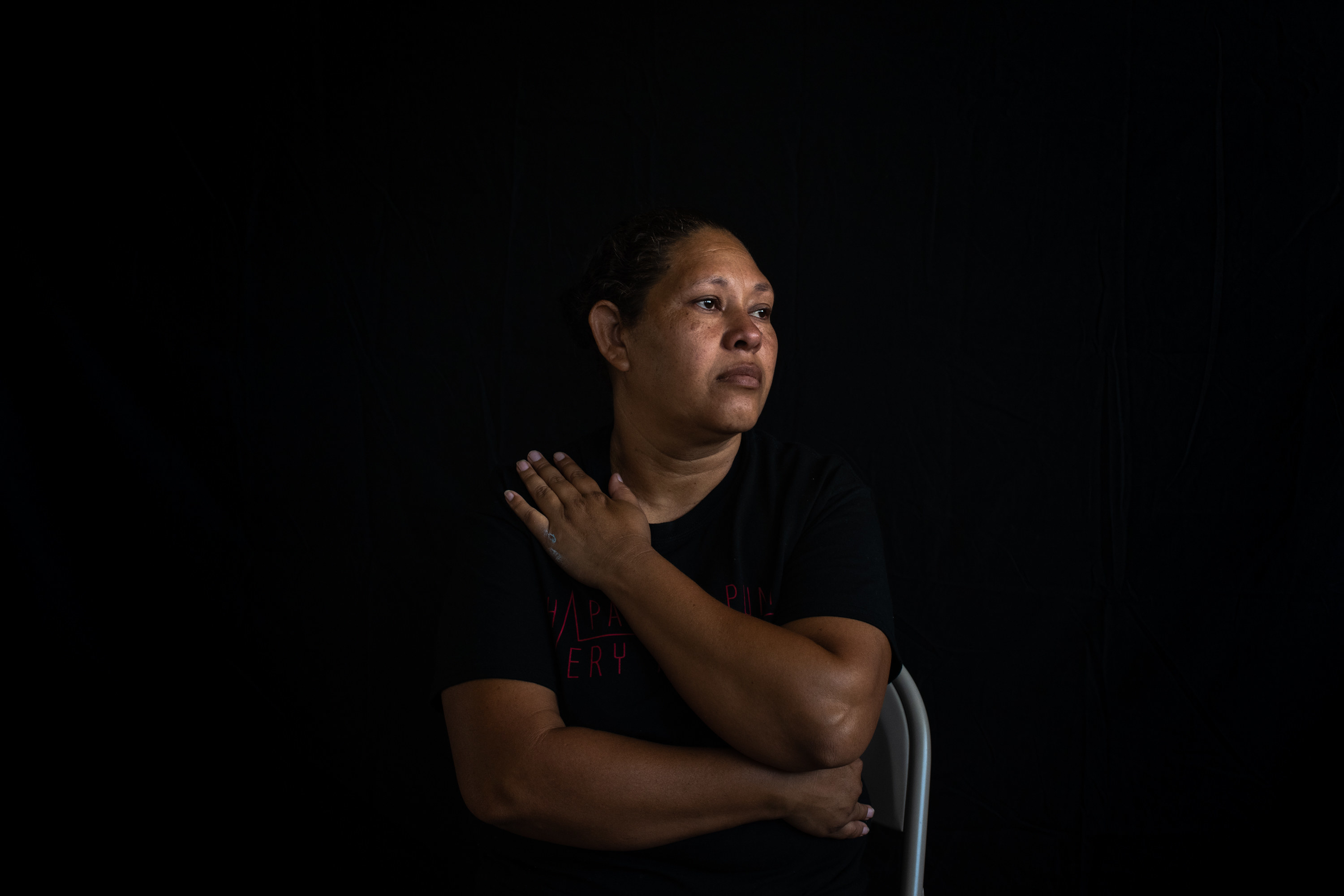
When Miriam Rodríguez speaks about her 15-year-old daughter, Leslie Isabel, it is with the tenderness a mother reserves for her youngest, her baby.
Back home in Honduras, Leslie Isabel was tricked and trafficked by men who promised to give her an American visa and said that they would do the paperwork for her to enter the US if she would just come with them. With the help of a local news station, Rodríguez was able to track her daughter to the border of El Salvador and rescue her. But once they returned home, they were no longer safe. "[The men who kidnapped her] were going to watch me at home — they were stalking me, stalking us," says Rodríguez. "I had to drop her off at school every day and then pick her up and immediately bring her home. I was afraid because they were there. They were always lurking."
Together, the mother and daughter tried to cross into the US in 2019 and were deported to Mexicali. A friend was murdered here recently, and Rodríguez has begun to feel less safe. "We fear for our lives. In other words, we have no security, either here or in our country — we can’t do anything."
Feeling out of options, Rodríguez made the heart-wrenching decision to send her daughter across the border alone for her safety, watching from afar until she saw Leslie Isabel taken into custody by US Customs and Border Protection officers. Rodríguez’s hope is for her daughter to make it to her aunt in Texas. "God forbid that any mother should feel what a mother feels being separated from her children in this life… She is my youngest," Rodríguez says. "We have never been separated before. I kept crying and crying. At least now, over the phone, she says to me, 'Mommy, I am fine, don’t worry, we will be together.'"
Rodríguez doesn’t regret her decision, since Leslie Isabel is safe now. "If something happens to me alone here, well, it’s better that happens to me alone instead of her." But she adds, "Knowing that she is somewhere else and I am here, it is hard."
"I felt completely alone." —Milagro Franco, 28
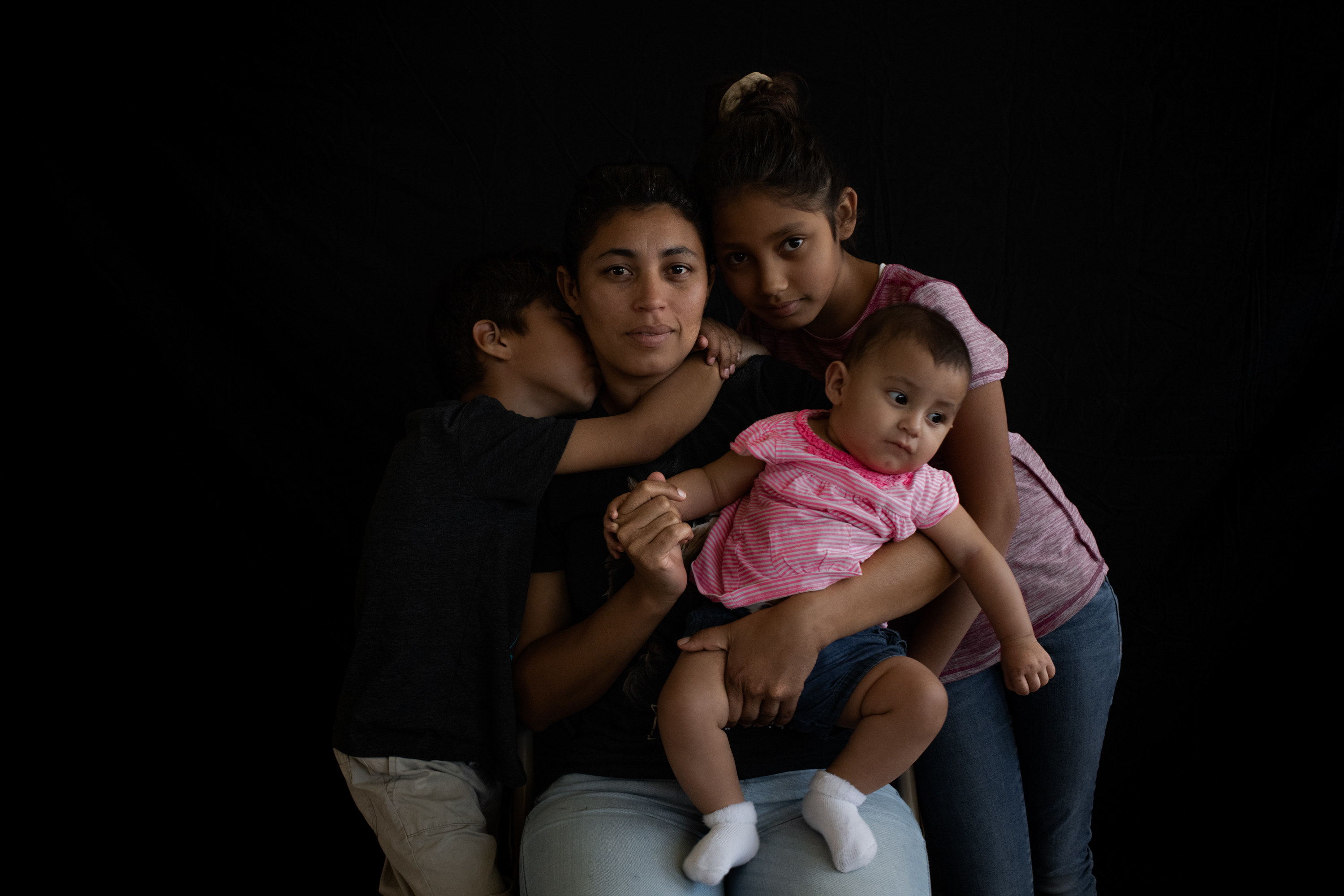
Three years ago, Milagro Rosales, now 28, decided to try to escape Honduras and an abusive husband and join her mother, who lives in Florida. Rosales took her two children and did not tell her husband she was leaving. She had a little money saved, just enough for train tickets and food for the children for the journey, but it did not last long. They arrived at the US border in June 2019. "When we got to Mexicali, we had nothing left, and I had to start begging," she remembers. She adds, "The truth is that I felt completely alone. It felt strange to be in a city that I didn’t know. I was afraid and scared."
Almost immediately, Rosales attempted to seek asylum in the United States. She could not afford a coyote or a smuggler, so she took a bus with her two children. "The bus dropped us off in the very center of Algodones. It was difficult. We spent a whole night trying to cross and fearing the dam, because we had to throw ourselves down there, and there were animals. We could even hear scary noises. So we tried until dawn, because the children were crying out of hunger. We were afraid, and scared of being kidnapped…since we heard people warning us about that, but thank God, we crossed!"
Border Patrol officers were waiting for them as soon as they crossed. Rosales describes trying to explain her situation, but her documents had been lost during the journey. "I lost everything. I was taking care of my children and not my backpack." They were put on a bus and, for a brief moment, Rosales thought that they were on their way to be reunited with their relatives. That might have been the hardest part, she says: "It’s been 20 years since I’ve seen my mom, and that was the biggest thrill. I thought I was going to see her, hug her, but no."
Instead, they were sent back into Mexicali. It was a devastating end to a dangerous journey. "They told us to wait a while here while the United States gave us a hearing so we could go to court and, well... I’m still here," says Rosales. "I have been here since 2019 waiting, I have gone to hearings, I have gone to court, I have even asked questions and I have been here for years. Imagine: I even had a Mexican baby! It was not my intention to bring another child into the world… I mean, I have it, and I fight for it, but I feel that everything was a failure."
"I really struggle, because there are so many things that go through my head and my heart," she says and gestures to her children. "They cry because they don’t want to be here, and I cry with them because I want to keep fighting. If I am not here, where will I be?"
After this interview was conducted, with help from Border Kindness, Rosales and her children were able to seek asylum in the United States.
"You want to see your child grow up." —Ileana García, 36
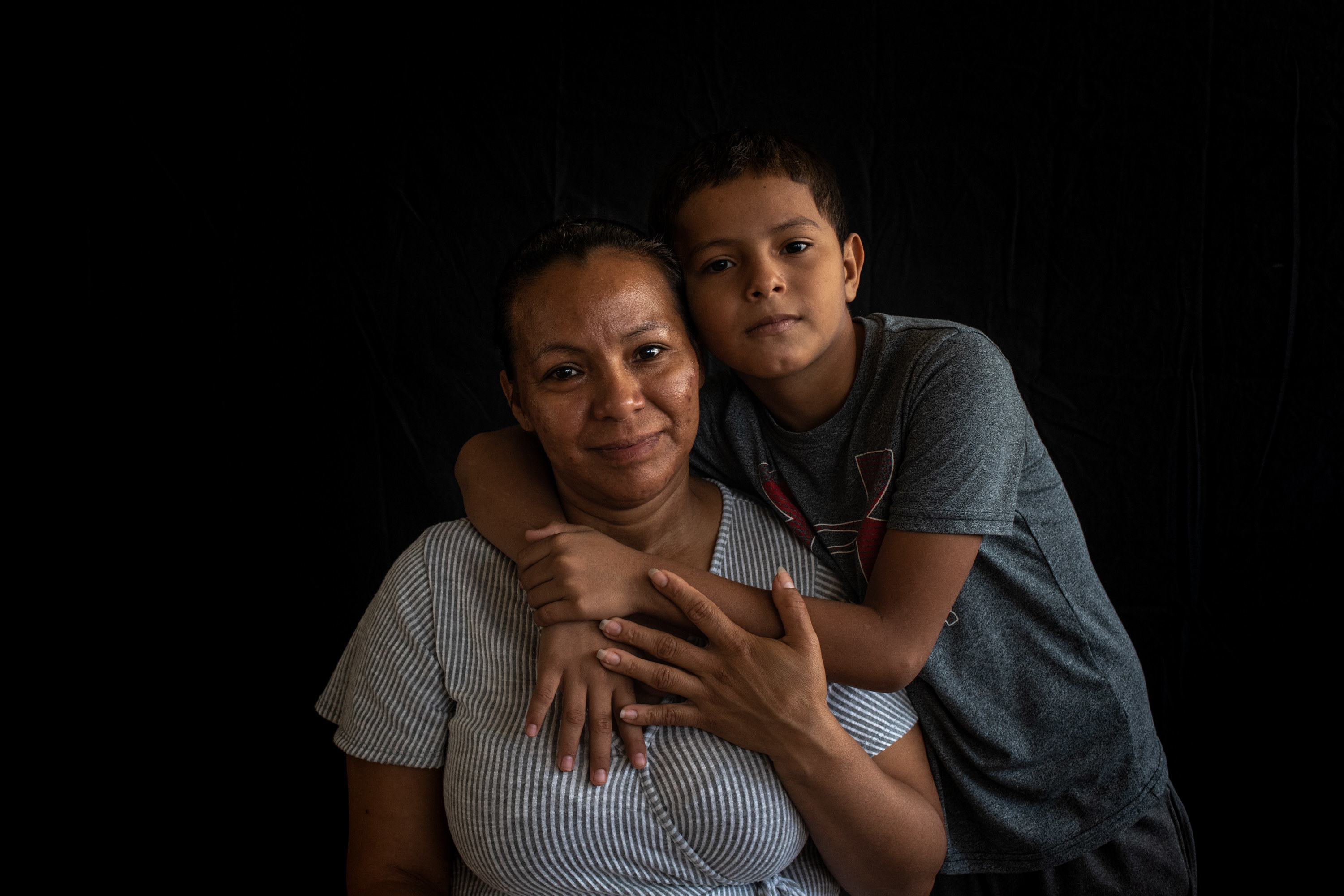
"Our country is getting worse every day. Because we don’t have any sources for jobs, we are forced to migrate, to leave our country, our homes," says Ileana García, 36, of her home in Honduras. "And we leave with a dream — leaving everything behind, which isn’t an easy process." García, a single mom, has a simple dream for her 11-year-old son José: "As a mother, you want to see your children grow up." Together, they left Honduras on April 10 and traveled by train and bus to Reynosa, in Tamaulipas, Mexico. On the night of April 25, they attempted to cross the Rio Grande by boat. García describes the process of being sent back to Reynosa as confusing and frightening. "I didn’t know anything. I asked them and they didn’t tell us anything… We started to cry, and we didn’t know what to do because they took off our shoelaces. And my son was crying, 'Why did they do this to us?' So it’s something that you don’t expect, because you come with great excitement, with great enthusiasm, but you couldn’t make it."
Now they are not sure what to do next. "Right now, because of my baby, I feel desperate," says García, "because sometimes he tells me, 'Mommy, I don’t want to be here anymore. We are in a shelter; I don’t want to be here anymore.'"
After this interview was conducted, with help from Border Kindness, García and her son were able to seek asylum in the United States.
“Home makes me remember my family, when I was united with them.” —Gloria Castillo, 23
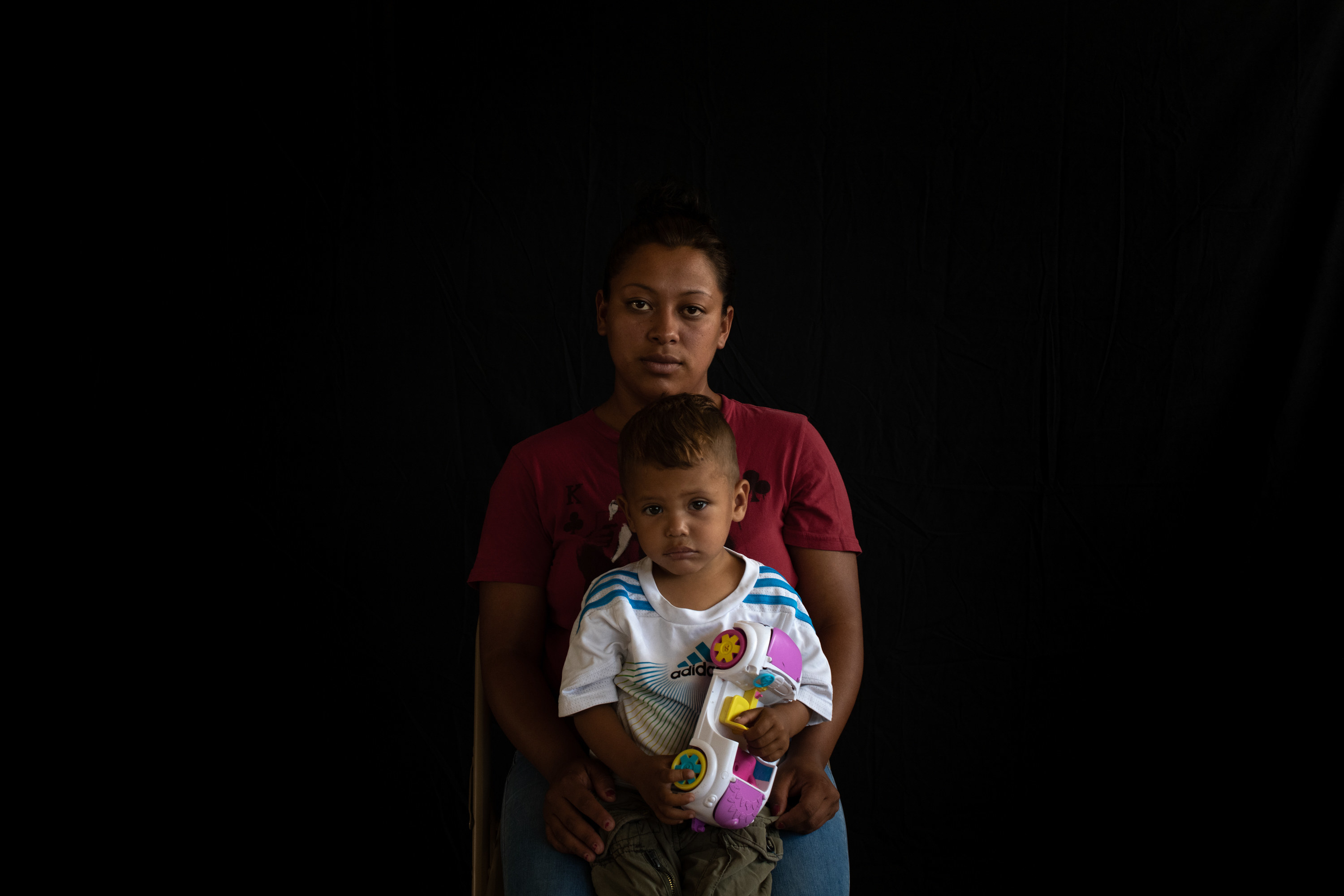
"The reason why I decided to leave my country was because eight months ago, my husband was murdered," says Gloria Castillo. She’s 23 years old.
Her husband ran a vegetable store in Honduras, where every week, a local gang demanded an extortion fee. There was one week when he could not pay. "When they came to collect the money from him, we were all there as a family," says Castillo, "and they took him out in front of me and my baby to kill him."
She tried to keep the business, to provide for her child. But the gang began extorting her too. "I had no way to pay, and the truth is that if I do not pay, they will do the same to me as they did to my husband," she said.
Fearing for her life, Castillo fled her home on March 9. She brought her 2-year-old son, Jesua, with her, but made the gut-wrenching decision to leave her other two children, 6-year-old Axel and 4-year-old Mareli, with her mother in Honduras. She didn’t know if she could make the difficult journey alone with three children. Now, when she calls home, she says, "It makes me very sad, because I know that I don’t have them with me."
Since arriving in Mexico in April, Castillo tried twice to seek asylum, both times at the border crossing in Los Algodones, Mexico. The first time, she was immediately deported to San Luis Río Colorado, a border town in the state of Sonora, Mexico. The second time, Castilo says that CBP officers began asking her questions. "At the beginning, the second time, I felt happy, because I said to myself, 'They are paying a little more attention to me!' Because they asked me if I had relatives? Why did I come? I felt a little more comfortable than the first time. But…my disappointment was when they put us on the bus to go back to San Luis."
Here in Mexicali, Castillo feels trapped between a home she cannot return to and family members across a border that she cannot reach. "The word 'home' makes me remember my family, when I was united with them," she says. Living with her son in a shelter here is difficult. "I feel like I’m alone, because I don’t have family or anyone to be here for me. [In the United States,] I have family.
"My plan is to cross again," says Castillo. But she worries, "I think if I tried again and the same thing happened, I would give up hope."
Interviews conducted by Enrique Huaiquil and Hailey Sadler.

